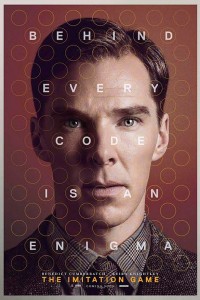 There are men who are given a set of challenges inside a system, and there are men who challenge the system. Alan Turing was the latter, and the code-breaker used his unique genius to win WWII. Beautifully brought to life by Benedict Cumberbatch, The Imitation Game tells the true tale of Turing’s time at Bletchley Park, where British Intelligence hired him and a team of men to crack “Enigma,” the encryption device used by the Nazi’s to communicate. During his time at Bletchley Park, Turing barbed the base commander at every turn (brilliantly portrayed by Charles Dance), who constantly questioned Turing’s unorthodox approach to breaking the code. His cohorts were also cantankerous, and his detached hubris didn’t help. His isolation is explained through flashbacks showing Turing as a solitary schoolboy with a single friend who rescued him from his bullying peers. The film takes a welcome turn when a fellow code-breaker named Joan Clarke (played by Keira Knightly) arrives, whose bond with Turing helps soften the team who would later defend the man they previously questioned, and the rest speaks for itself through history. Sadly, the very country he helped save then turned against him, forcing dangerous hormone medication to rectify his homosexual status, which ultimately ends in tragedy.
There are men who are given a set of challenges inside a system, and there are men who challenge the system. Alan Turing was the latter, and the code-breaker used his unique genius to win WWII. Beautifully brought to life by Benedict Cumberbatch, The Imitation Game tells the true tale of Turing’s time at Bletchley Park, where British Intelligence hired him and a team of men to crack “Enigma,” the encryption device used by the Nazi’s to communicate. During his time at Bletchley Park, Turing barbed the base commander at every turn (brilliantly portrayed by Charles Dance), who constantly questioned Turing’s unorthodox approach to breaking the code. His cohorts were also cantankerous, and his detached hubris didn’t help. His isolation is explained through flashbacks showing Turing as a solitary schoolboy with a single friend who rescued him from his bullying peers. The film takes a welcome turn when a fellow code-breaker named Joan Clarke (played by Keira Knightly) arrives, whose bond with Turing helps soften the team who would later defend the man they previously questioned, and the rest speaks for itself through history. Sadly, the very country he helped save then turned against him, forcing dangerous hormone medication to rectify his homosexual status, which ultimately ends in tragedy.
Much like Einstein, Edison, or Newton, Alan Turing’s name should be universally acknowledged, and The Imitation Game might solidify that sentiment. The English-language directorial debut of Norway’s Morten Tyldum is adapted from Andrew Hodges’ biography: Alan Turing: The Enigma, and there’s no better actor of today’s generation than Benedict Cumberbatch. The Resident “it-man,” is riveting.
DISHES: 4.5/5
